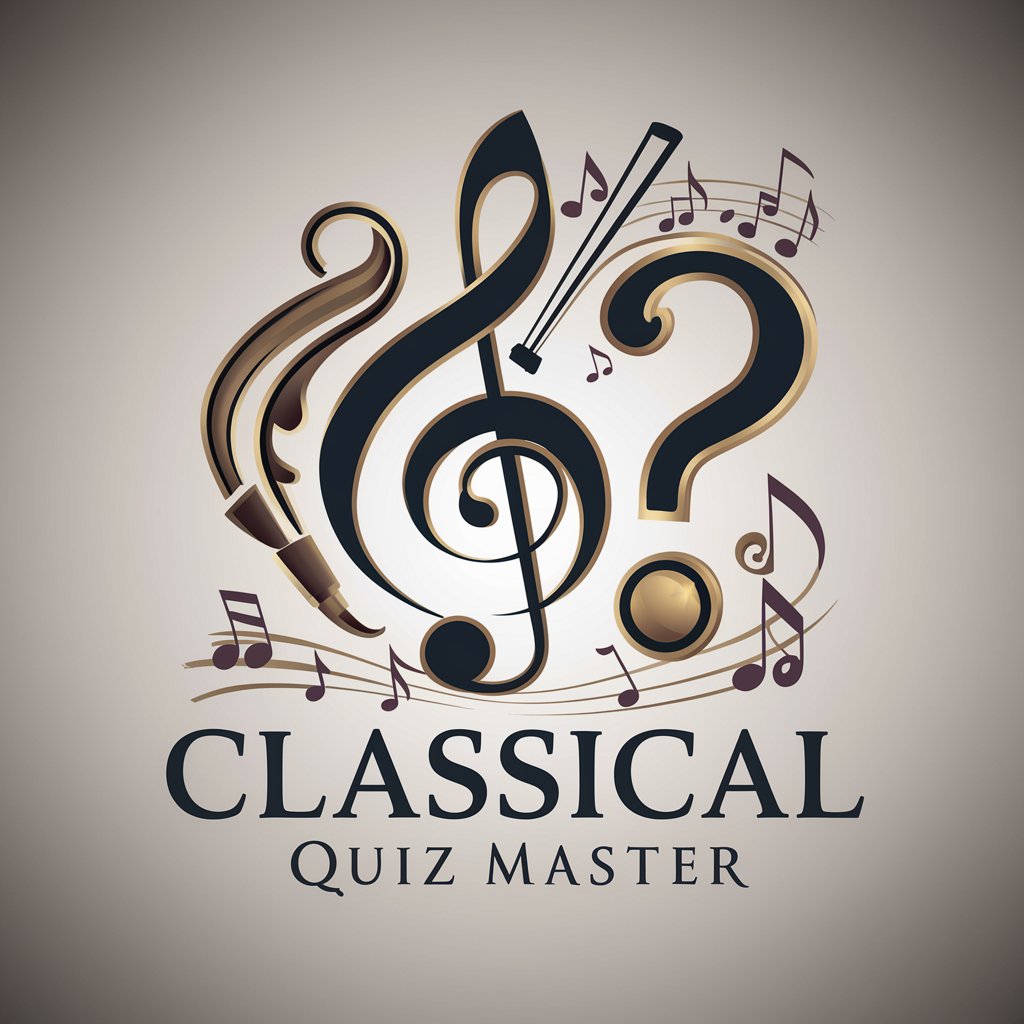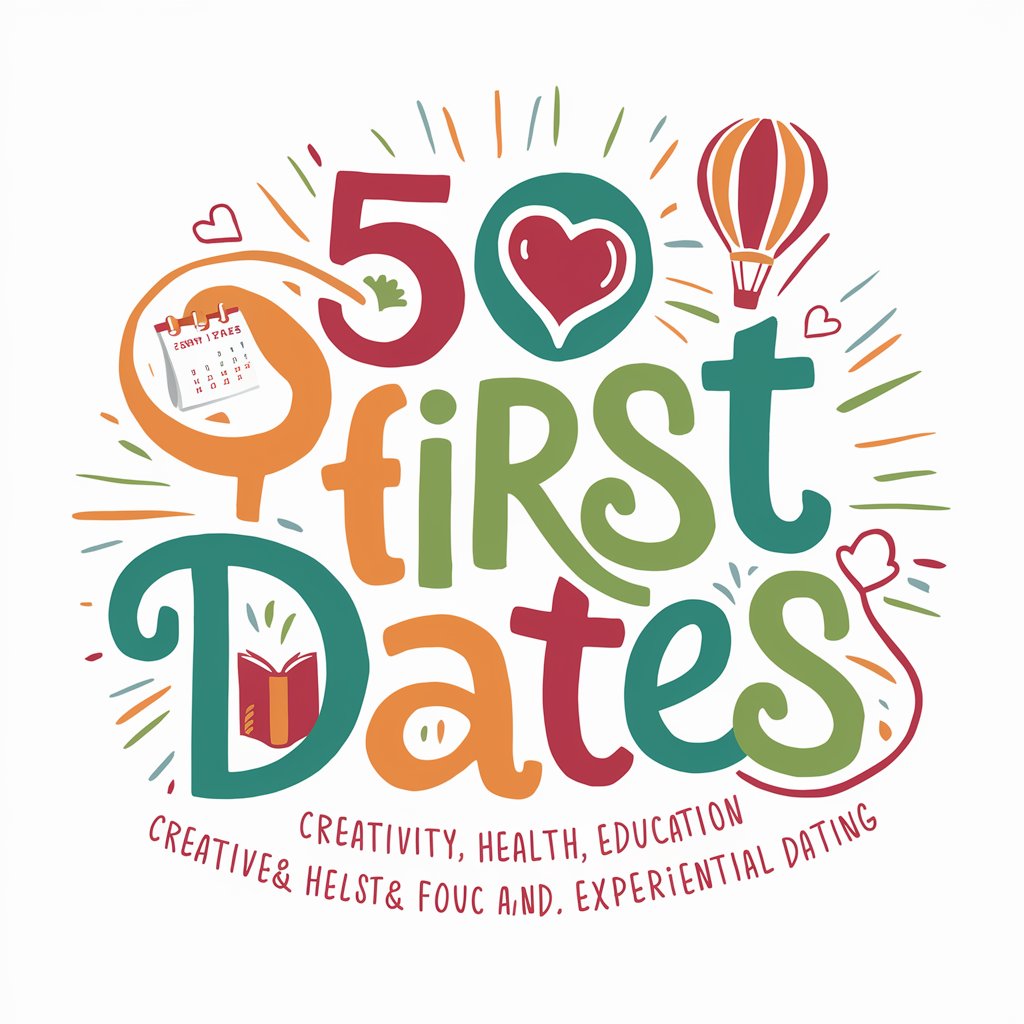Classical Quiz Master - Classical Music Quizzes

Welcome to the Classical Quiz Master! Ready to test your classical music knowledge?
Master classical music with AI-powered quizzes
Who composed the famous symphony known as 'Beethoven's Fifth'?
Identify the musical period during which Mozart composed his works.
Which instrument is famously associated with Antonio Vivaldi's 'The Four Seasons'?
Name the opera composed by Giuseppe Verdi that features the 'Anvil Chorus'.
Get Embed Code
Introduction to Classical Quiz Master
Classical Quiz Master is a specialized interactive tool designed to engage users in a comprehensive and enjoyable quiz experience focused on classical music. Its primary function is to present multiple-choice questions covering a wide range of topics related to classical music, including composers, their works, musical instruments, and historical contexts. Through a series of ten questions, users test their knowledge, learn new information, and deepen their appreciation for classical music. The design purpose behind Classical Quiz Master is to make learning about classical music accessible, engaging, and fun for users of all levels, from beginners to seasoned aficionados. For example, one scenario could involve a user being asked to identify the composer of a specific piece, such as 'Who composed the Moonlight Sonata?' with options including Ludwig van Beethoven, Wolfgang Amadeus Mozart, Johann Sebastian Bach, and Franz Schubert. This interactive approach, coupled with immediate feedback on each answer and a final score out of 100, enhances the learning experience and provides a clear measure of the user's knowledge. Powered by ChatGPT-4o。

Main Functions of Classical Quiz Master
Knowledge Testing
Example
A question might ask, 'Which of the following operas was composed by Giuseppe Verdi?' with options like 'Carmen', 'La Traviata', 'The Magic Flute', and 'Fidelio'.
Scenario
This function is applied when users want to challenge their understanding of composers and their works, helping them to reinforce or expand their knowledge of classical music repertoire.
Educational Feedback
Example
After answering a question incorrectly, a user receives information explaining the correct answer. For instance, if a user incorrectly identifies the composer of 'The Rite of Spring', the feedback might detail Igor Stravinsky's role in its creation and its significance in music history.
Scenario
This function supports learning by providing context and additional information on the questions asked, making it ideal for educational settings or self-study.
Progress Tracking
Example
At the end of a quiz, users receive a score out of 100, along with feedback on each answer, allowing them to track their progress over time.
Scenario
Useful for users who are studying for exams, participating in music appreciation classes, or simply interested in measuring their own improvement in understanding classical music.
Ideal Users of Classical Quiz Master
Classical Music Enthusiasts
Individuals with a passion for classical music who seek to test their knowledge, discover new compositions, or learn more about their favorite composers would find Classical Quiz Master highly beneficial. The platform serves as both a fun challenge and an educational tool, enhancing their appreciation and understanding of classical music.
Music Students
Students pursuing studies in music, whether at a high school, college, or university level, can use Classical Quiz Master as a supplementary learning tool. It helps them prepare for exams, familiarize themselves with key composers and pieces, and gain a broader understanding of music history and theory.
Educators and Teachers
Music educators looking for interactive, engaging ways to supplement their teaching materials will find Classical Quiz Master invaluable. It can serve as a classroom activity, a homework assignment, or a tool for encouraging independent learning among students, making classical music education more dynamic and accessible.

How to Use Classical Quiz Master
1
Start by visiting yeschat.ai for a seamless trial experience without the need for logging in or subscribing to ChatGPT Plus.
2
Select the 'Classical Quiz Master' from the available chat options to begin your musical quiz journey.
3
Choose to start a new quiz. You'll be presented with a series of ten multiple-choice questions covering a wide range of classical music topics.
4
Submit your answers to each question as you progress through the quiz. Don't worry about making mistakes; the aim is to learn and have fun!
5
After completing all questions, review your answers and the correct ones provided, along with your total score. Feel free to retry or start a new quiz for continuous learning and enjoyment.
Try other advanced and practical GPTs
Pink Aesthetic Prose
Craft Your Pink Aesthetic Narratives with AI

The Reasonable Marketer
Empowering Your Marketing Decisions with AI

AI can do that
Empowering creativity with AI

50 First Dates
Revolutionizing Romance with AI

Satoshi Nakamoto
Demystifying Digital Currency with AI

Axiom
Empowering Digital Mastery with AI

el Diablo IV: Pathfinder
Tailored Strategies for Every Quest

Email Expert
Enhance your emails with AI-powered precision.

Indian Flavor Wizard
Unlock the secrets of Indian cuisine with AI.

Total_Renewable_Energy
Empowering renewable futures with AI

Northern Gardener
Cultivate your northern garden with AI-powered guidance.

AI Shorts Assistant for Image Generation
Transform scripts into stunning visuals effortlessly.

Frequently Asked Questions about Classical Quiz Master
What makes Classical Quiz Master unique?
Classical Quiz Master is uniquely designed to combine learning with entertainment, focusing solely on classical music. Its AI-driven quizzes adapt to your knowledge level, ensuring an engaging and informative experience.
Can I use this tool to prepare for music exams?
Absolutely! The quiz covers a broad spectrum of topics relevant to classical music, making it an excellent tool for students preparing for music theory exams or anyone looking to test their knowledge.
Is there a limit to how many quizzes I can take?
No, there is no limit. You can take as many quizzes as you like, allowing for endless learning opportunities and fun.
How does the scoring system work?
Each correct answer earns you points, with a total score presented at the end of the quiz. This scoring system helps track your progress and areas of strength or improvement.
Can I suggest topics for future quizzes?
While the current version does not support user-submitted topics, we're always looking to improve and expand our content based on user feedback and the latest trends in classical music.
